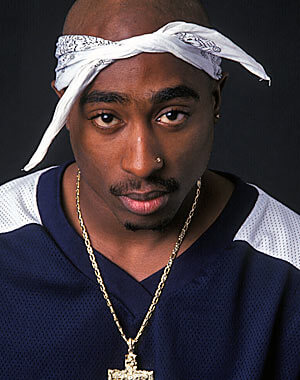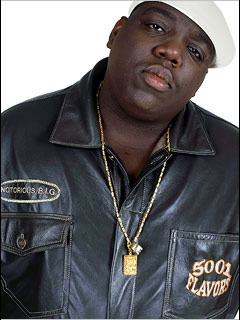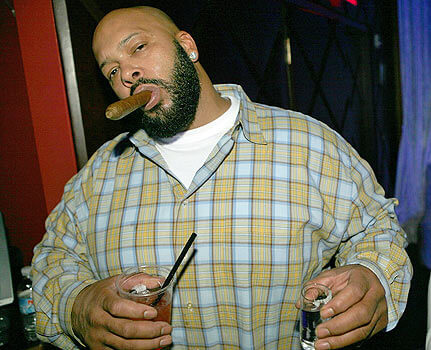Let’s say a newspaper publishes a blockbuster story based on anonymous sources. The story receives wide skepticism because it is not sourced. Then a named source steps forward, and the newspaper knows about it.
Why wouldn’t the newspaper publish that fact?
Chuck Philips was a Pulitzer prize-winning reporter for the Los Angeles Times. In 2002, he published a front-page blockbuster story that claimed to solve the most famous murder in rap history: the murder of Tupac Shakur.

Above: Tupac Shakur
Philips claimed the murder was ordered by the other biggest rap star in history: Biggie Smalls. According to Philips, Biggie provided the gun and the money for the hit, as part of a rivalry between East Coast and West Coast rappers.

Above: Biggie Smalls
But many people mocked Philips’s story, because he couldn’t get anyone to go on the record. People said: wait. Biggie Smalls was in Vegas and there are no named witnesses?
Then Chuck Philips ran across someone who said he was a witness: a man named Waymond Anderson.

Above: Waymond Anderson
In a deposition, made public on this site earlier this week, Anderson said he was on the phone at the time Biggie provided the gun. Anderson made these claims under oath — using his real name. As I recently reported, the L.A. Times obtained that deposition.
Think about it. For the first time in history, a man had stepped forward to corroborate, under oath, the most critical aspect of one of the most controversial stories of Chuck Philips’s career.
The L.A. Times knew this. But never reported it.
Why did this happen? I don’t know. But I have a theory.
But before you hear the theory, understand the facts. The facts are what make the theory plausible.
THE FACTS
Consider the following facts, which are all public record — and many of which were revealed for the first time in my recent post on Waymond Anderson’s deposition:
- Waymond Anderson was incarcerated for murder. (Full disclosure: my boss prosecuted him.) He claims he is innocent. He wrote Chuck Philips a letter. In that letter, he said something to get Philips interested in his claim of innocence of murder.
- Philips has long been fascinated with the murders of Tupac Shakur and Biggie Smalls. He wrote a story about the murder of Tupac, and when he was laid off, he was working on a story about the murder of Biggie.
- In his deposition, Anderson says he knows who killed both Biggie and Tupac. He says it’s the same guy who framed him for murder.
- Anderson is the only person in the world who has stepped forward to corroborate Philips’s claim that Biggie Smalls paid for the hit on Tupac, and provided the gun. Anderson claims that he heard all this happen, on the phone, while he was in jail facing murder charges.
Do you think Waymond Anderson mentioned all that in his initial letter to Chuck Philips?

Above: Chuck Philips
- LAPD and the FBI investigated Suge Knight for possible involvement in the murder of Biggie Smalls. Biggie’s family believes that the murder was carried out on the orders of Suge Knight, with help from corrupt LAPD officers David Mack (now incarcerated for bank robbery) and Rafael Perez (who served time for stealing cocaine from the evidence locker).
- Chuck Philips has been accused of being overly close to Suge Knight. He has written numerous stories sympathetic to Knight, and has even been accused of taking money from Knight. He wrote numerous stories disparaging the theory that Suge Knight and LAPD officers were behind the murder of Biggie.

- Chuck Philips wrote a blockbuster front-page story claiming Waymond Anderson was innocent, and had an alibi for his murder. Philips left out numerous details that strongly suggest Anderson is guilty, and that his alibi is bogus. Philips never mentioned in the story that Waymond Anderson was a witness with knowledge about the Biggie or Tupac murders, or that Anderson claimed the guy who framed him is the guy who killed Biggie and Tupac.
- Before Waymond Anderson met Chuck Philips, Anderson had told authorities that he had heard Suge Knight was behind the murder of Biggie Smalls. Biggie’s family had him as a witness on their witness list.
- After Chuck Philips wrote that story for Waymond Anderson, Biggie’s family deposed Waymond Anderson.
- Waymond Anderson now recanted everything he had said about Suge Knight and LAPD being involved in the Biggie murder. He also made several claims that cast doubt on the credibility for several other witnesses who had claimed Suge Knight and LAPD were behind the murder of Biggie.
Do you think it’s a coincidence that Anderson first said Suge Knight was dirty in the Biggie murder — then took it all back after Philips, a Suge Knight partisan, wrote a story helping Anderson with his murder case?
Anderson now says it was no coincidence. He says Philips smuggled threatening messages from Suge Knight into prison, which frightened Anderson and caused him to recant what he had said about Suge Knight. The FBI has been looking into Anderson’s claims.
- In the same deposition, Anderson gave his wild-sounding stories about how he was framed by the guy who killed Tupac and Biggie — and how that person, having framed Anderson for the arson-murder, then confessed his guilt in the murders of Tupac and Biggie to Anderson in (presumably recorded) phone calls made to Anderson while he was incarcerated.
- The L.A. Times played up Anderson’s recantation (which helped Suge Knight) and did not mention the wild stories about the murder of Tupac and Biggie (which hurt Anderson’s bid for innocence and made Philips’s story look questionable).
Do you think it was an accident that the L.A. Times mentioned only the parts of the deposition that helped Suge Knight and the LAPD — but left out the stuff that made their own story about Anderson’s innocence look goofy and questionable?
MY THEORY
Based upon the above facts, here is my theory of what happened.
I believe Waymond Anderson wrote Chuck Philips and said: I know who killed Tupac. I know who killed Biggie. That story you wrote about Biggie providing the gun for Tupac’s murder? It’s true. I know because I was on the phone.
Oh — and the guy who killed them, also framed me for murder. Would you like to write a story about how I’m innocent?
There’s no way that Anderson wrote Philips a letter — which he admitted doing in his deposition — and didn’t mention those facts.
So Philips writes the story of Waymond Anderson’s innocence, leaving out several facts that suggest Anderson is guilty. Anderson wants to remain in Philips’s good graces, so Philips will keep writing stories for him. And he knows Philips thinks Suge Knight is innocent of any involvement in the Biggie murder.
So Anderson gives a deposition saying Suge was innocent — and that he had lied when he had previously said Suge was guilty. He also makes up a bunch of other stuff to undercut the plaintiffs’ case, discrediting several other witnesses.
Problem is, in that deposition, he also says he knows who killed Biggie and Tupac. And, he says, it’s the same guy who framed him for murder.
This makes him sound like a crackpot. So the L.A. Times omits any mention of the more crackpot portions of his testimony, and reports only the stuff that helps destroy the civil case implicating Suge Knight.
Did the L.A. Times consider Waymond Anderson’s claims to be credible? If so, why not report his claim to corroborate Chuck Philips’s story?
Did the L.A. Times consider Waymond Anderson’s claims to be incredible? If so, why publish a front-page article claiming he was innocent, when that claim of innocence rests on his claims of innocence (and an alibi theory that was inconsistent with Anderson’s own recorded statements to police)?
Either way, something is very wrong about all this. It stinks to high heaven. And it’s about time someone started asking questions about it.







